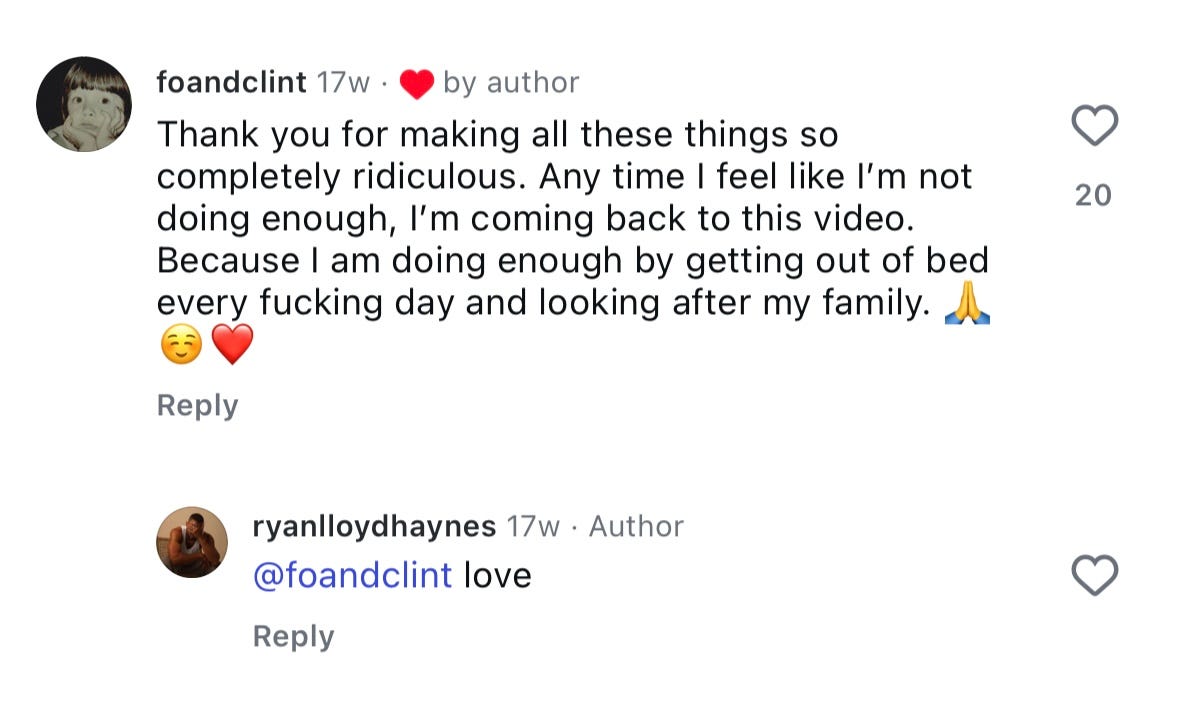Decoding the ‘Truth Bomb Don'
When trust is through the floor, truth hits.
This article is a deep dive on the work of Ryan Lloyd Haynes, whose MOMT podcast episode just dropped here on Spotify or here on Apple. Read this or listen to that in any order. Like the chicken and the egg, no one cares which comes first.
Meet Ryan Lloyd Haynes.
There’s something uncomfortably human centipede about attempting cultural commentary on a cultural commentator. Like a joke explained, the funny dies. But I’ve been desperate to unpick why it is that I admire Ryan - the man, the myth, the content creator. What lies beneath this admiration is a deeper set of truths I need to know. I’m sure of it.
And I think truth, as related to the world around us today, is probably the operative word.
Born in Coventry to parents from both the UK and the Caribbean, Ryan’s spent most of his adulthood running the clothing brand, Elsie and Fred, with his sisters Natalie and Leanne. A photographer and videographer by trade, in the last year or so he’s founded a running group (@letsrunwithpurpose) and a studio in Hackney, London, (@project.neighbourhood) - documenting this and a broader hunt for meaning from his personal account (@ryanlloydhaynes).
Armed with despair - or grief as we discuss in our pod sit down - in the wake of Elsie and Fred closing its doors, and dismay at the downturns in community, connection, wealth equality, men’s mental health - let’s just call it the state of the world, he produces short form monologues cum video essays and they hit hard. Really fucking hard.
But why?
Convenience Trumps Credibility
Let’s check the news. We can always trust the news…
In June this year (2025) we crossed the divide from TV to Social Media for our predominant source of news. Interesting.
However, only 25% of those surveyed in the UK trust news from Social compared to a 50% trust level for TV. Eeesh.
In the US, of the 54% of Americans who now get their news from social platforms, a staggering 22% cited Joe Rogan as their source for news over the period of the presidential inauguration. Shit.
All is not lost, though. As this re-distribution of news is both a cause and metaphor for the wider proliferation of mistrust. Systems that underpin everything from finance to pharmaceuticals and food production to modern day politics have continued their iterative design journeys from favouring the many to the few. The questioning of history itself is itself being questioned - revisioned narratives unbiasing majority protagonists are now back in the hands of their original and all powerful editors as they claw the pendulum back from whence it came.
To trust what we’re told or even how to live is, in effect, to take a leap of faith.
The Feeling of Truth
Experiencing a trusted perspective has become so rare it’s almost visceral. Beyond a cognitive understanding emerges an actual feeling, and with that feeling comes a sigh of relief as everything immediately becomes totally clear. It’s an alchemy amongst the noise in a world only getting louder.
Now more than ever, voices that speak truth don’t just get heard, they get felt.
Like others in this MOMT community - I’m thinking of Charlie Craggs and her work on Trans rights, or Adwoa Botchey and Solomon Adebiyi as re-educators of African mythologies, Ryan provides these feels. They’re not newsreaders. They’re truthsayers. Using the very platforms that lack trust to garner it, reaching millions and shifting perspectives for the better in the process.
Decoding the ‘Truth Bomb Don'
Ryan’s videos cover male violence, community running, injecting frog juice, digital health and more. But to really decode his truth bomb’s ‘Don’ status, the first of his videos to pop all the way past the 10 million view mark - a 52 second straight to camera piece on wellbeing culture - is the one I’m going to geek out on here first.
As a former Meta creative strategist, wheeled around the world to speak about short form video narrative structures and styles, I can tell you that this video is Zuckerberg’s wet dream. 175 words at 202 words per minute disconnects brains from thumbs and in this world that’s half the job. The half that’s yukky, let’s be honest. A tight, handheld shot feels casual, authentic and, yeah, trustable, too, which helps. But this is all just tactics.
As a human reflecting on my contribution at Meta convincing brands and creators to produce shorter and faster, I can tell you that without substance, this alone is a one way ticket for the race to the bottom. Ryan’s substance is his weight of words; in this video (shown above) it’s a prose on the absurdity of wellbeing tropes and commodification, finessed with a healthy dose of parody. The comments being proof of a truism shared.
During our interview for the MOMT pod, Ryan referred to this video as “Silly.” “Silly?” I thought. Sure, it’s tongue in cheek, but comments like the above are far from silly. They’re shifts in mindsets. They’re alleviated anxiety. They’re lost perspectives back with their rightful owners. But shortly after this conversation I got to understand what he was really saying once he’d posted another monolog-y video. Equally tactically astute. Equally weighty with words. But this time a deeper, more systematic, personal yet wide reaching subject matter.
In Hope of The Upswing
The phrase “speaking truth to power” has Quaker origins dating back to the 1950s during the promotion of non-violent protesting against the Cold War. But the voices of those who have done this have been heard through centuries, not decades, and from within the very centre of almost every reformation movement there’s been.
I often wonder (perhaps like you) whether power has ever been as concentrated and centralised as it is today, and in what form reformation will take when if and when it comes. At the heart of coming change has to be a shift from ‘I’ to ‘we’. In the book, The Upswing, Robert Putnam and Shaylyn Romney Garrett trace how every great period of renewal in America began with voices that dared to speak uncomfortable truths out loud - voices that insisted on community over isolation, equity over hierarchy, and trust over suspicion. These truth-sayers, often dismissed at first, were the sparks that set broader reformations alight. Ryan, with his monologues in one hand and his IRL community building work in the other, stands in that lineage; a reminder that the next upswing will not be initiated by any new political system or corporate reckoning, but by people. People speaking up, listening hard, trusting truth and acting…. together.




